Blog (446 found)
The Myanmar National Human Rights Commission Continues Failing to Deliver
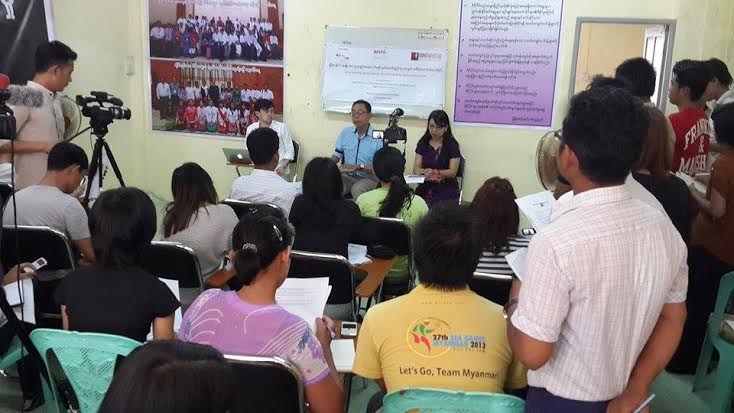 A report authored by Burma Partnership and Equality Myanmar was launched on 25 September 2014 in Rangoon revealing the continuing ineffectiveness of the Myanmar National Human Rights Commission (MNHRC) as well as the lack of independence from the government. The report was launched on the same day that a reshuffle of the members of MNHRC was announced by the government, which came as a complete surprise to civil society organizations due to the lack of consultation.
A report authored by Burma Partnership and Equality Myanmar was launched on 25 September 2014 in Rangoon revealing the continuing ineffectiveness of the Myanmar National Human Rights Commission (MNHRC) as well as the lack of independence from the government. The report was launched on the same day that a reshuffle of the members of MNHRC was announced by the government, which came as a complete surprise to civil society organizations due to the lack of consultation.
Released at the Myanmar Journalists Network in Rangoon, Burma: All the President’s Men, contributed to the annual Asian NGO Network on National Human Rights Institutions (ANNI) Report on the Performance and Establishment of National Human Rights Institutions in Asia (2014). The report analyzes the Myanmar National Human Rights Commission Law 2014 enacted in March this year (enabling law) that institutionalizes the mandate of the MNHRC. The report finds that the law does not guarantee independence from the government and in particular, the president’s office. In contravention of international standards on national human rights institutions, namely the Paris Principles, the selection process does not adequately consult with civil society. As the report points out, “It is up to the selection board to come up with procedures for short-listing candidates, yet the enabling law itself should set out the process/procedure for selection, with consultations with civil society.” The members of the MNHRC are actually chosen by a selection board of ten, five of which are from the government or are government-affiliated. The enabling law states that two members of this board are to come from civil society organizations and a further two are to be MP, yet there is no transparency regarding the procedures under which the two MPs are chosen. Additionally, the chosen civil society members to the selection board are restricted to registered civil society only, thus excluding many outspoken and critical political and human rights groups who feel they cannot register under the current climate […]
• • •Arrest of Student on Trumped-up Charges is a Damning Indictment of Justice in Burma
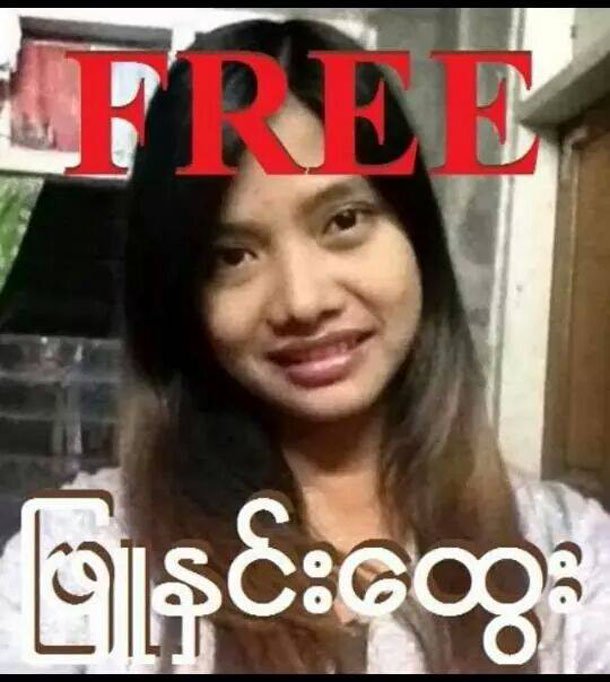 On 13 September 2014, police arrested female human rights defender (HRD) Phyu Hnin Htwe at her house in Patheingyi Township, Mandalay Region, and sent her to Monywa Prison, Sagaing Region, where she is currently being detained. Phyu Hnin Htwe is a second-year Burmese student at Mandalay’s Yadanabon University, and is also an activist and member of the All Burma Federation of Student Unions (ABFSU). She has helped farmers who have been forcibly evicted to make way for the infamous Chinese-backed Letpadaung copper mine in Sagaing Region, going to the Letpadaung area at weekends and supporting displaced farmers.
On 13 September 2014, police arrested female human rights defender (HRD) Phyu Hnin Htwe at her house in Patheingyi Township, Mandalay Region, and sent her to Monywa Prison, Sagaing Region, where she is currently being detained. Phyu Hnin Htwe is a second-year Burmese student at Mandalay’s Yadanabon University, and is also an activist and member of the All Burma Federation of Student Unions (ABFSU). She has helped farmers who have been forcibly evicted to make way for the infamous Chinese-backed Letpadaung copper mine in Sagaing Region, going to the Letpadaung area at weekends and supporting displaced farmers.
Her arrest ostensibly relates to a murky incident that took place on 18 May of this year. Two Chinese workers – employees of Wanbao company, the main company involved in the joint venture – were seized from the Letpadaung area, taken to a monastery in Hsete Village, and held there for about 30 hours. The incident followed efforts by Wanbao employees to restart measuring plots of land for which compensation had not even been provided, in spite of villagers’ protests, thereby provoking their anger.
As a result, Phyu Hnin Htwe and six villagers were charged with kidnapping and abduction under Articles 364 and 368 of the Penal Code, which prescribe sentences of up to ten years’ imprisonment. While the case against five of the villagers was quickly dropped, charges still remain against Phyu Hnin Htwe and local villager Win Kyaw, neither of whom attended court in May […]
• • •Karen Civil Society Rallies Around Japan’s Harmful Plans for Eastern Burma
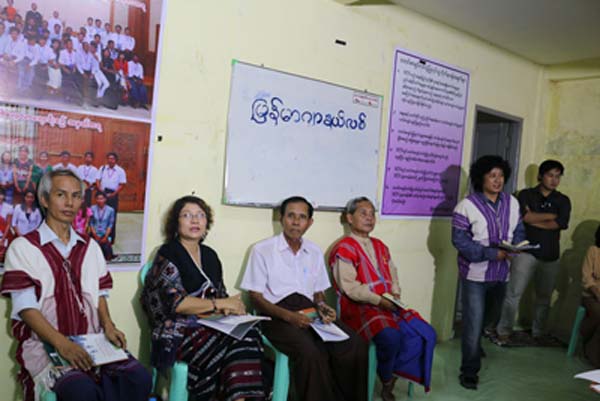 Japan’s lofty development plans for eastern Burma were very publicly rejected by the Karen Peace Support Network (KPSN) at a press conference in Rangoon, citing lack of consultation with communities and the potential for such plans to fuel conflict. Based on a blueprint for extensive development projects produced by the Japanese International Cooperation Agency (JICA), the overseas development arm of the Japanese government, 28 Karen civil society organizations that form the KPSN, released a report to outline their concerns and recommendations. JICA’s blueprint, in which its main goal is to support the return of refugees and internally displaced persons (IDPs), contains four main components; economic corridors, free trade zones and industrial estates, industrial clusters, and urban development. The Japanese government has been working closely with both the Union level and State level Burmese Government in the development of this plan.
Japan’s lofty development plans for eastern Burma were very publicly rejected by the Karen Peace Support Network (KPSN) at a press conference in Rangoon, citing lack of consultation with communities and the potential for such plans to fuel conflict. Based on a blueprint for extensive development projects produced by the Japanese International Cooperation Agency (JICA), the overseas development arm of the Japanese government, 28 Karen civil society organizations that form the KPSN, released a report to outline their concerns and recommendations. JICA’s blueprint, in which its main goal is to support the return of refugees and internally displaced persons (IDPs), contains four main components; economic corridors, free trade zones and industrial estates, industrial clusters, and urban development. The Japanese government has been working closely with both the Union level and State level Burmese Government in the development of this plan.
For Karen civil society, however, there are many concerns, as outlined in the report released on 9 September. Although the blueprint aims to “promote peace through development,” JICA has not conducted a conflict analysis on what is an extremely complicated and fragile context. In fact the plans could serve to exacerbate conflict by facilitating land confiscation, one of the loci of tension in the ceasefire process. Also, improving transport and road access to areas traditionally held by ethnic armed groups such as the Karen National Union (KNU), allows easy access for Burma Army soldiers to the heart of Karen areas. We must not forget the abusive nature of the Burma Army that has been terrorizing civilians for decades and continues to do so, despite a ceasefire in place. Will exposing more communities, who are already vulnerable to abuses, to the unreformed Burma Army really aid peace […]
• • •Unity Must Prevail
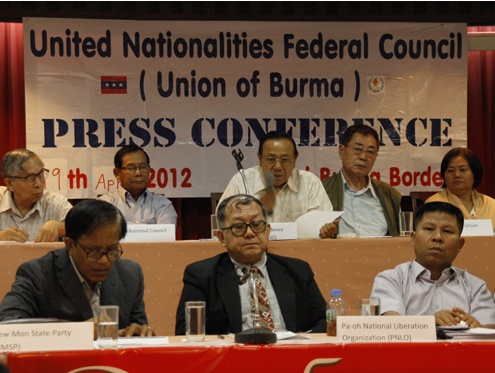 After its organizational conference held on a Thailand-Burma border area, disagreements between the United Nationalities Federal Council (UNFC) and the Karen National Union (KNU) has led to the KNU suspending its’ membership of the UNFC, a setback for the peace process. While this strikes a blow into the government engineered narrative that the peace process is making substantial progress, it is particularly worrying for the ethnic communities that have been suffering from this conflict for decades.
After its organizational conference held on a Thailand-Burma border area, disagreements between the United Nationalities Federal Council (UNFC) and the Karen National Union (KNU) has led to the KNU suspending its’ membership of the UNFC, a setback for the peace process. While this strikes a blow into the government engineered narrative that the peace process is making substantial progress, it is particularly worrying for the ethnic communities that have been suffering from this conflict for decades.
Ostensibly, disagreements over organizational structure have caused this rift, although there are also disagreements within the KNU leadership itself over its position in the UNFC, leading to fears of a split within what has traditionally been the most prominent ethnic armed group. Previous Burma regimes have used divide and rule tactics to weaken armed resistance and to sabotage ethnic unity and it is imperative that this does not happen now. As ethnic leaders squabble over leadership structures, surely much to the delight of the leaders of the Burma Army, it is the most vulnerable populations who feel the pressures, while the government manages to convince elements of the international community that a peace settlement is just around the corner. It is crucial that whatever reason for the KNU’s withdrawal from the UNFC, they must put the ethnic communities at the forefront of their decision making […]
• • •Draconian Sentences of Unity Weekly Journalists Must at the Very Least be Drastically Reduced
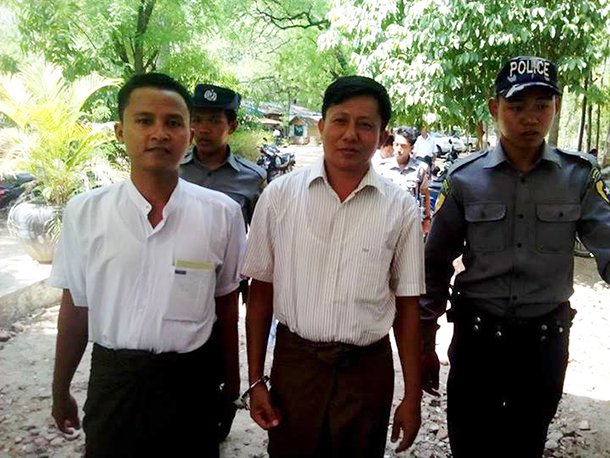 On Thursday 28 August, lawyer Robert San Aung submitted to Magwe regional court the final appeal against the harsh verdicts brought against the five Unity Weekly journalists on10 July. They were sentenced to ten years’ imprisonment with hard labor following the publication of a report in January of this year that gave details of an alleged chemical weapons facility in central Burma. They were charged for trespass and for “disclosing state secrets” in violation of the 1923 Official Secrets Act (OSA). Robert San Aung submitted the appeal on the grounds that the four reporters are innocent and should therefore be released from prison, and that the sentence of the journal’s executive be reduced by half. The Magwe regional court is expected to issue a decision within a month.
On Thursday 28 August, lawyer Robert San Aung submitted to Magwe regional court the final appeal against the harsh verdicts brought against the five Unity Weekly journalists on10 July. They were sentenced to ten years’ imprisonment with hard labor following the publication of a report in January of this year that gave details of an alleged chemical weapons facility in central Burma. They were charged for trespass and for “disclosing state secrets” in violation of the 1923 Official Secrets Act (OSA). Robert San Aung submitted the appeal on the grounds that the four reporters are innocent and should therefore be released from prison, and that the sentence of the journal’s executive be reduced by half. The Magwe regional court is expected to issue a decision within a month.
While the offense under Section 3(1)(a) of the OSA is a strict liability offense – meaning that the prosecution only has to prove that the defendants were in the vicinity of the prohibited place for them to be found guilty – in order for the other convictions to stand, the burden is on the prosecution to show that the secrets alleged to have been leaked were intended to or were likely to have breached state security or assisted an enemy. The journalists must be shown to have leaked detailed and useful information, to have done more than just report that the facility was a weapons factory. It is not clear that the prosecution ever satisfied this requirement.
Even so, if the appeal submission fails to convince the court either that the journalists are not guilty of any substantive offenses, or that there are specific and legitimate defenses under the OSA that can be relied upon, then at the very least the appeal should be successful on grounds of mitigation regarding the alleged offenses, meaning that the sentences should at a minimum be drastically reduced […]
• • •Elusive Nationwide Ceasefire Agreement Continues to Distract from Substantial Peace Talks
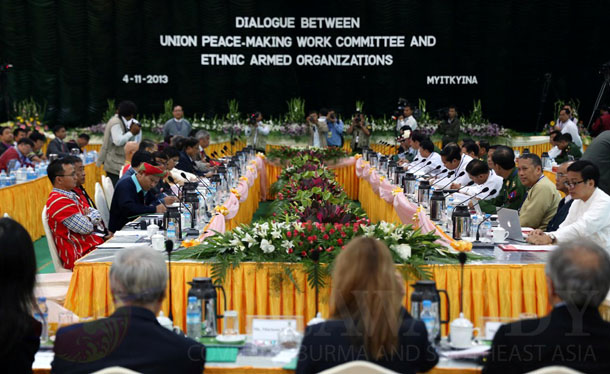 As talks over the signing of a nationwide ceasefire agreement (NCA) are delayed once again, thus pushing substantive dialogue further into the future, Burma’s decades long civil war rages on in Kachin and Shan States.
As talks over the signing of a nationwide ceasefire agreement (NCA) are delayed once again, thus pushing substantive dialogue further into the future, Burma’s decades long civil war rages on in Kachin and Shan States.
Talks over the signing of the NCA have now gone on for nearly 18 months and the situation on the ground has still not changed. The Burma Army continues to attack ethnic armed groups in areas where ceasefires have been signed, such as those of the Shan State Army South and Shan State Army North, as well as continuing offensives against the Kachin Independence Army and the Ta’ang National Liberation Front (TNLA) where there is no ceasefire. On Monday 18 August, a civilian in Namkan Township, Shan State was shot dead and another hospitalized after a clash between the TNLA and Burma Army. Human rights violations such as sexual violence, arbitrary arrest, torture and extrajudicial killing continue in these active conflict areas, while in areas where individual ceasefires are holding, the Burma Army is entrenching its power both militarily and economically through land confiscation and reinforcement of its positions.
The aim in this pursuit of the NCA is questionable as it distracts from the real issues at hand that prevent the ethnic people of Burma from enjoying genuine peace. Let us not forget that the Burma government has already signed ceasefire agreements with most ethnic armed groups. But has this stopped the attacks and human rights violations inflicted on local communities by armed forces? This question cannot be answered in the affirmative. Just ask the villagers who live in Murng Hsu, Shan State, whose homes came under artillery attack, and were forced to act as guides for the Burma Army in June of this year in a supposed ceasefire area. If all groups sign on to the NCA, the biggest question is how can they trust that the Burma Army will actually cease its attacks. There is scant evidence of this from current and previous ceasefires […]
• • •Reform of the Police and the Judiciary is a Matter of Urgency
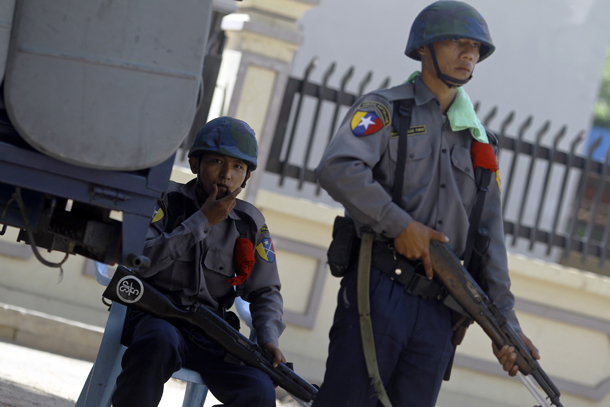 Over recent weeks, there has been a spate of unprovoked attacks by the Burma Police Force on peaceful, innocent civilians. On 14 August, nearly 50 police personnel in Mandalay Region shot at a group of around 200 farmers from Nyaung Wine Village, Singu Township. According to the Asian Human Rights Commission (AHRC), a 30-year-old mother of two, Ma San Kyin Nu, is allegedly one of the victims, and has been admitted to Mandalay General Hospital for urgent medical treatment as a result of her injuries. The farmers were protesting against the fact that over 6,000 acres of their land was confiscated in 1991 by the 121 Logistic Battalion of the Burma Army – without any compensation being provided – by continuing to plough their fields.
Over recent weeks, there has been a spate of unprovoked attacks by the Burma Police Force on peaceful, innocent civilians. On 14 August, nearly 50 police personnel in Mandalay Region shot at a group of around 200 farmers from Nyaung Wine Village, Singu Township. According to the Asian Human Rights Commission (AHRC), a 30-year-old mother of two, Ma San Kyin Nu, is allegedly one of the victims, and has been admitted to Mandalay General Hospital for urgent medical treatment as a result of her injuries. The farmers were protesting against the fact that over 6,000 acres of their land was confiscated in 1991 by the 121 Logistic Battalion of the Burma Army – without any compensation being provided – by continuing to plough their fields.
After the police violence, the protesting farmers prevented police from making any arrests; however, later, another 100 police arrived and blockaded the entire village. Local residents then took matters into their own hands and briefly detained about 40 police officers, angered at the brutal approach of the police to the land conflict. Although the policemen were eventually released after negotiations, the dangers and risks of uncontrolled police violence and impunity are evident: blood has been shed and anarchy has prevailed. Even if police allegations that the protestors were armed with slingshots is true, under no circumstances is the use of live ammunition by police or other state security forces on civilian protestors proportionate or justified.
Furthermore, on 14 May, All Burma Federation of Students Union (ABFSU) member Kaung Htet Kyaw was beaten by police during a suppression of a farmers’ protest in Thegon Township in Pegu Region. Kaung Htet Kyaw sustained severe head injuries. ABFSU responded by releasing a statement denouncing police mistreatment [..]
• • •Political Opposition in Burma Must Ignore Distractions and Focus on Policy
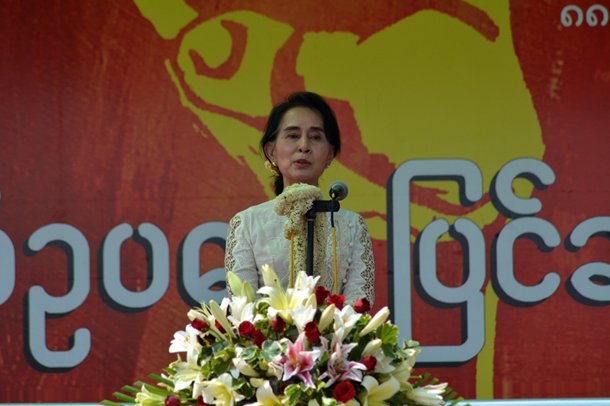 The main opposition party in Burma, the National League for Democracy (NLD), said last week that almost 5 million people signed the petition calling for constitutional reform that did the rounds from 27 May to 19 July. The petition pushed for the removal of the Burma Army’s veto on constitutional change that they have by virtue of Article 436 of the Burma Constitution. This campaign has been widely praised as a shrewd tactical move, because it would in theory unlock the door to amendments of any offending articles of the Burma Constitution that undermine democratic values and infringe upon the fundamental rights of the people. Most notably – though by no means exclusively, as the NLD and others are at pains to stress – amendment of Article 436 will in turn enable amendment of Article 59(f), which in practice bars Daw Aung San Suu Kyi running for President in the 2015 elections.
The main opposition party in Burma, the National League for Democracy (NLD), said last week that almost 5 million people signed the petition calling for constitutional reform that did the rounds from 27 May to 19 July. The petition pushed for the removal of the Burma Army’s veto on constitutional change that they have by virtue of Article 436 of the Burma Constitution. This campaign has been widely praised as a shrewd tactical move, because it would in theory unlock the door to amendments of any offending articles of the Burma Constitution that undermine democratic values and infringe upon the fundamental rights of the people. Most notably – though by no means exclusively, as the NLD and others are at pains to stress – amendment of Article 436 will in turn enable amendment of Article 59(f), which in practice bars Daw Aung San Suu Kyi running for President in the 2015 elections.
While such a public initiative is to be applauded, and the weight of support for the petition is to be welcomed, the political opposition in Burma must not allow itself to be distracted by such diversionary machinations on the part of the Burma Government and the ruling Union Solidarity and Development Party (USDP). The NLD is right that constitutional reform is essential to the establishment of genuine democracy in Burma. However, it is also time for the political opposition to test the limited democratic space that now exists in Burma, and time to start outlining a viable policy platform for government. The burden rests with the NLD and other democratic opposition parties to engineer a seismic cultural and political shift: away from politics traditionally centred on personalities and fear, and towards politics based on actual policies that will resolve people’s grievances and promote and protect their political, economic, social and cultural rights.
• • •Move to Proportional Representation a Power Grab by the Military-backed USDP
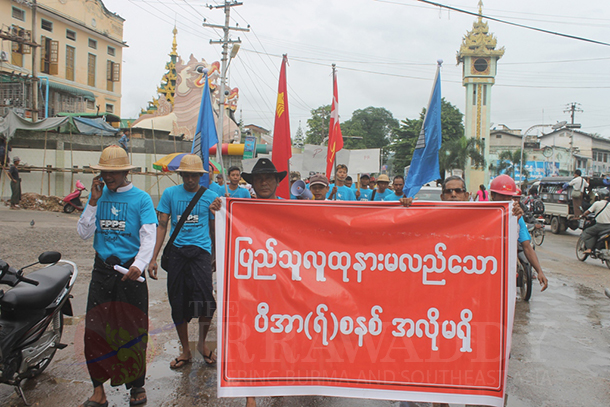 The debate over a potential change to Burma’s electoral system, from a First Past the Post System (FPP) to a Proportional Representation System (PR) is gathering momentum, with a new committee formed by the Parliamentary lower house speaker, Shwe Mann, to discuss whether this is appropriate for the country. While the general debate over suitability of differing electoral systems is complex and broad, if seen through the eyes of the context in Burma, there is one clear winner if this change is implemented before the 2015 general election: the military-backed Union Solidarity and Development Party (USDP) which is unsurprisingly supportive of this change.
The debate over a potential change to Burma’s electoral system, from a First Past the Post System (FPP) to a Proportional Representation System (PR) is gathering momentum, with a new committee formed by the Parliamentary lower house speaker, Shwe Mann, to discuss whether this is appropriate for the country. While the general debate over suitability of differing electoral systems is complex and broad, if seen through the eyes of the context in Burma, there is one clear winner if this change is implemented before the 2015 general election: the military-backed Union Solidarity and Development Party (USDP) which is unsurprisingly supportive of this change.
The argument for Burma to change to PR is certainly compelling. Theoretically, it will give smaller political parties, such as the NDF who proposed the motion, more chance of representation in the legislature, while the same goes for smaller ethnic political parties. Yet it is much more complex than this. For constituencies in ethnically concentrated areas, where there is a dominant ethnic political party, for example the Rakhine Nationalities Development Party (RNDP) in Arakan State, FPP is more advantageous for that dominant ethnic political party, as seen in the RNDP’s dominance of the Arakan State legislature. Focusing on winning seats in ethnically concentrated areas might be the only way that ethnic political parties guarantee representation under the first past the post system. Yet under PR, if the total population of a certain ethnic group is under the 1% threshold of votes needed to gain a seat that is typical of PR, then that party will not win any seats at all, even if the ethnic nationality it represents is dominant in certain constituencies.[…]
• • •New Special Rapporteur, Familiar Human Rights Abuses
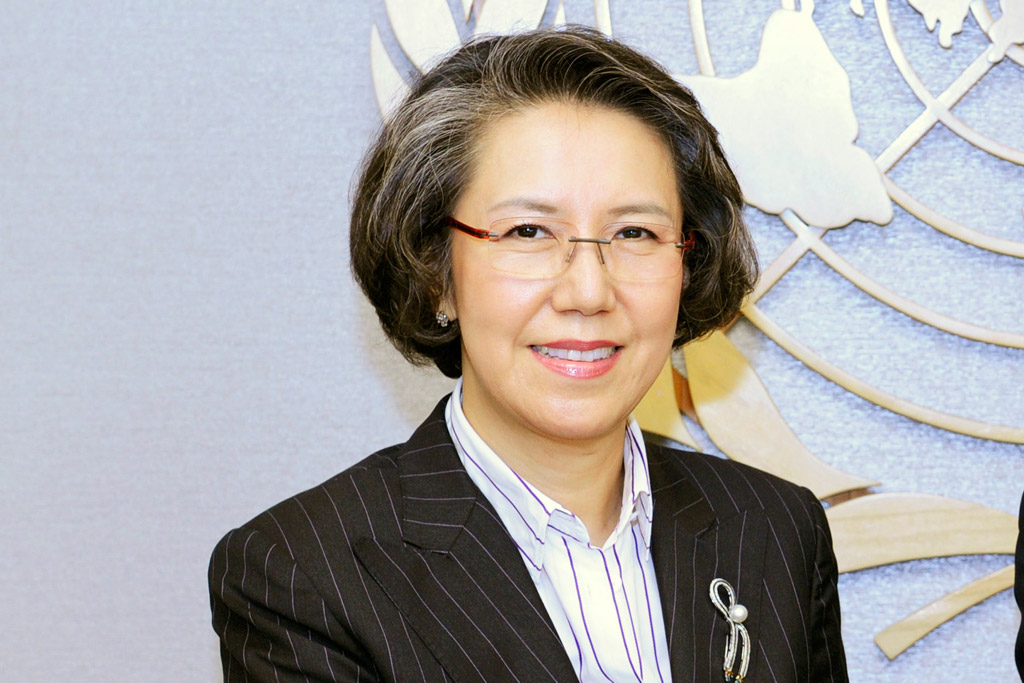 The new Special Rapporteur on the situation of human rights in Burma, Ms. Yang Hee Lee, concluded her first visit to the country on 27 November, and unsurprisingly, found the human rights situation troubling, warning of the potential of backtracking on initial reforms, an analysis that resonates with many Burma followers. She outlined her initial findings at Rangoon airport in a statement just as she finished her mission, highlighting the shrinking of democratic space, the ongoing religious violence and discrimination, the deteriorating humanitarian conditions for internally displaced persons (IDPs) – especially Muslims – in Arakan State, the severe human rights abuses in Kachin State, the urgent necessity for legislative reform and the rule of law, the lack of involvement of women in both the peace process and governance, the exclusion of local people in large scale development projects and the impact of such projects on vulnerable communities, and the continuing incarceration of political activists, among other issues.
The new Special Rapporteur on the situation of human rights in Burma, Ms. Yang Hee Lee, concluded her first visit to the country on 27 November, and unsurprisingly, found the human rights situation troubling, warning of the potential of backtracking on initial reforms, an analysis that resonates with many Burma followers. She outlined her initial findings at Rangoon airport in a statement just as she finished her mission, highlighting the shrinking of democratic space, the ongoing religious violence and discrimination, the deteriorating humanitarian conditions for internally displaced persons (IDPs) – especially Muslims – in Arakan State, the severe human rights abuses in Kachin State, the urgent necessity for legislative reform and the rule of law, the lack of involvement of women in both the peace process and governance, the exclusion of local people in large scale development projects and the impact of such projects on vulnerable communities, and the continuing incarceration of political activists, among other issues.
We welcome Ms. Lee’s open and honest discussion of the term “Rohingya” and her pledge to be guided by international human rights law as regards the use of this term. This was despite the insistence of government officials not to use the word “Rohingya” throughout her trip to Arakan State. On the basis of this principled stance, we are reassured that Ms. Lee will not flinch from using the term when appropriate in the future. After visiting two camps for IDPs, one for Arakan Buddhists and one for Rohingya Muslims, Ms. Lee was troubled by both the terrible conditions in the camps and the lack of humanitarian access that is resulting in people dying due to insufficient medical assistance. She also acknowledged that this situation is “undeniably worse” in the camp for Rohingya. While she did not explicitly state that this is a situation engineered and maintained by the authorities, it is obvious that the unequal treatment of Buddhist and Muslim IDPs is a deliberate policy by the government that further punishes the Rohingya simply due to their ethnicity.
• • •








 All posts
All posts